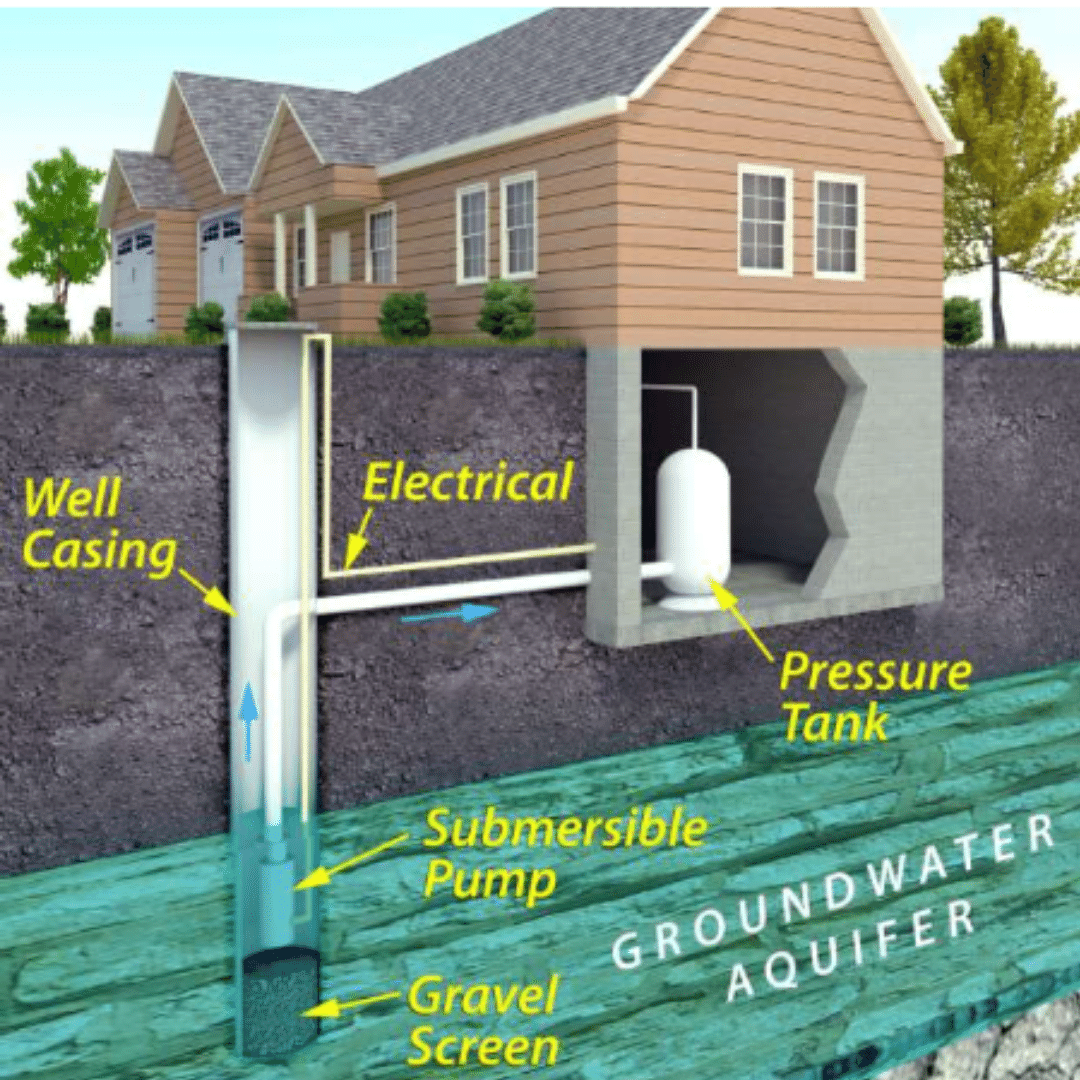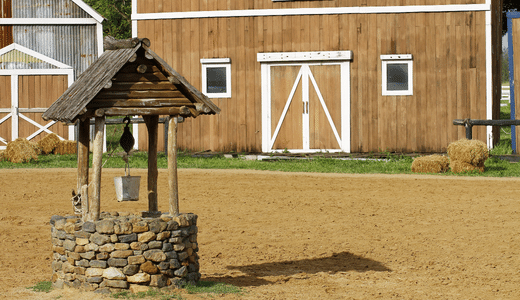If you live in a home that uses city water, you may be wondering how well water works and how it’s different than the water flowing out of your taps. In this post, we’ll explain everything you need to know about living with well water including the pros and cons of using it.
What is well water?
Well water is water that comes from a hole dug deep into the ground, which reaches groundwater from an aquifer (a layer of water-bearing rock or sediment) far below the surface. This groundwater is the well water’s supply, and it’s brought up to homes using a pump or bucket. Well water is owned and maintained by the homeowner; which means it is free to use, but not tested or treated by the government.
History of well water
Traditionally, to access groundwater in underground aquifers, one would dig and create a structure to then draw water out using a pump or bucket. Some of the earliest evidence of civilizations using wells to retrieve water is in China as early as 6,000 to 7,000 years ago, according to Forest Hydrology: An Introduction to Water and Forests.
In ancient Egypt, a water pump called a saqia was invented to lift water from out of a well from a depth of 10 meters. Digging wells for water has been around for thousands of years and many people are still using this method to get water in their homes with a little help from modern plumbing.
What does it mean to have well water?
If a home is supplied by well water, this means that the home gets its water for drinking, bathing, and cooking from a private well nearby. Most well water homes will be in rural areas as opposed to a city where houses are much closer together. If you live in an urban area, your water is considered city water, meaning, the water is owned by the city or municipality. If you’re unsure whether your home uses well water or city water, there’s a simple way to know. If you receive a water bill each month for treatment and delivery of water, your home uses city water. Homes that use well water supply pay out of pocket for maintenance, water testing, and other upkeep expenses.
If you’re thinking that there can’t be that many households that use well water, think again. According to the EPA, over 13 million households in the United States rely on well water for all their home water needs. And with modern plumbing, well water has come a long way since 600 B.C.
How does well water work?
Well water is still true to the original idea, in that well water comes directly from the ground. To create a well, a hole is dug in the ground, in some cases as far as 1,000 feet below the surface. The well water’s hole is held open by a pipe that reaches all the way to the aquifer, the source of the water. Professionals install a pump to carry the well water from the ground to the plumbing pipes. Then, this pump, powered by a motor, pulls the well water from the aquifer and distributes it through the plumbing system, ultimately reaching the home. Once the well water reaches the house, it lives in the pressure tank, which then goes to your shower, kitchen faucet, and any other faucet in a home.
Here’s a helpful illustrated video showing the inner workings of a well system.
The process from getting water from the well to your glass is quite simple. With the use of modern plumbing, a house with well water is getting water straight from the source, resulting in fresh water that has not been through any extensive filtering from the city. However, well water only has benefits if it is monitored and treated properly.
Pros and cons of well water
Since water is such an essential part of our daily lives, it’s very important that you’re drinking the cleanest, healthiest water you can. If you’re in the process of purchasing a home with well water, or you’re curious about well water and its benefits, we’re here to ensure you’re as educated as possible. Here are the advantages and disadvantages of using well water in your home:

Pros of using well water:
- High nutrients and minerals: Well water is typically higher in nutrients and minerals. Compared to city water, well water is fresher since it’s coming directly from the aquifer without going through a filtering process. Before city water gets to your home, the water goes through a filtration process to kill parasites, bacteria, viruses, and germs by using chlorine and chloramine. Well water is free of additives while still maintaining the healthy nutrients and minerals that are good for you.
- No water bill: You won’t have to pay a water bill each month. Because the water coming into the home is privately owned, you won’t be cutting a check to the city each month for water. However, there is still some upkeep and maintenance involved with owning a home with well water, though it’s not a monthly bill.
- Protection from contamination after natural disasters: Well water is usually protected from natural disasters that could result in contamination. Natural disasters, especially floods, can bring water contamination. Grounds and infrastructures are shifted, resulting in an unhealthy increase of contaminants to the water. If a city is flooded too heavily, a boil order will be issued, and homeowners should not use their homes water. Thankfully, well water supplies are usually immune from natural disasters.
Cons of using well water:
- Requires electricity: Well water is dependent on electricity. Since well water is typically pulled from the ground using a pump, that pump needs power from somewhere. Thus, the pump runs on electricity. So, if the electricity in your home goes out, the pump will stop working, which means no water. If you live in a house with well water, it’s wise to keep another means of power on hand, like a generator or solar power.
- Homeowner’s responsibility:. Because the source of the home’s water is on your property, the homeowner is responsible for the water including initial installation of the well, maintenance, repairs, etc. The homeowner is also responsible for testing the well water to ensure it’s safe to drink. Lastly, if the well runs out of water, it is not the city’s problem to take care of.
- Safety: Not all well water is completely clean. Even though well water is straight from an aquifer, it could still contain some things you do not want to be drinking. Run off from septic systems, nearby farms, or power plants can all infect your well water. Even if the well is far from anything man-made that could affect your water, there’s still a chance that dead animals, pet waste, or stormwater runoff could impact the quality of your water. Because well water is not tested by the city, the only way you’d know if your water is contaminated is by testing it yourself. If your water is contaminated, you’ll also be responsible for treating it.
What to do if your home uses well water
Since well water is not filtered and tested by the city, it’s important to filter the water coming into your home. Aquasana’s Rhino® Whole House Well Water System Filter filters 500,000 gallons of well water for clean and healthy drinking, cooking, and bathing water. This filter is designed specifically for well water contamination to protect from bacteria, viruses, cysts, and other contaminants commonly found in private well water. Additionally, the system includes a pre-filter to capture more sediment and rust that’s more common in well water and a UV filter to get total home protection.
WHOLE HOUSE WATER FILTER
Rhino® Well Water with UV
Protects from bacteria, viruses, cysts, and other contaminants commonly found in well water. Lasts for 5 years or 500,000 gallons.
.png)
Furthermore, if you live in an older home that relies on well water, you should also be aware that your pipes could be a source of contamination. Lead-based plumbing wasn’t banned until 1986, so older homes may use lead pipes. Even if the well water is treated by a whole house system, you’ll also want to use a point of use under sink, countertop, and/or shower filter to ensure it doesn’t get contaminated while flowing through your home.

